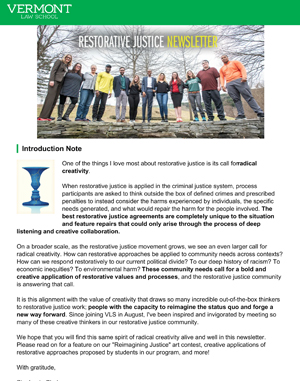The nationally recognized Environmental Law Center (ELC) at Vermont Law School welcomed seven undergraduate students into its pilot "New Frontiers in Environmental Law and Policy" summer program, currently under way. New Frontiers was designed to give undergraduates the tools they need to become powerful advocates for the environment.
New Frontiers students are enrolled in a course covering environmental law and policy development, including a discussion of economics, federalism and justice. The course compares and contrasts the major environmental statutes, such as the Clean Water Act, Clean Air Act, Toxic Substances Control Act and other federal statutes. It considers the goals and objectives of environmental laws, and the choices that are made both implicitly and explicitly in effecting the means of environmental protection. In addition, students explore state roles in biodiversity protection and land use regulation.
Throughout the course, faculty and students discuss whether environmental justice issues have been taken into account, and how to remedy injustices.
"New Frontiers in Environmental Law and Policy is a unique opportunity for undergraduate students to connect with the Environmental Law Center's advocacy-oriented faculty and staff, who have influenced environmental policy locally and globally," said Professor Melissa Scanlan, director of the ELC. "We are inspired by the undergraduates' determination to get a jumpstart on their careers in environmental advocacy and look forward to seeing what they do next."
Professor Laurie Beyranevand '03, associate director of the Center for Agriculture and Food Systems (CAFS) at VLS, mentors the undergraduates each afternoon. They review the major themes covered in their course, participate in substantive discussions about environmental policy, review the basics of legal analysis, and visit relevant Vermont attractions, including a cohousing community that practices sustainable land management, an advocacy organization that has run successful environmental campaigns, and the state capital.
"I am continually impressed by these undergraduate students and their drive to influence environmental law and policy," Beyranevand said. "They represent our next generation of leaders, and I am honored to contribute to their education on law and policy issues. It's been a pleasure having them on campus this summer."
When not in class, students enjoy hiking, tubing on the White River, and other outings accompanied by Vermont Law School students.
For more information about New Frontiers in Environmental Law and Policy for undergraduate students, visit www.vermontlaw.edu/academics/undergraduate/new-frontiers.
The Environmental Law Center at Vermont Law School offers more than 64 courses related to the environment and environmental law, more than any other law school in the United States, and four environmental law clinics: the Environmental and Natural Resources Law Clinic, Energy Clinic, Food and Agriculture Clinic, and Land Use Clinic. The ELC's Summer Session, which offers 36 classes taught by 44 faculty, is world-renowned. For more information about the Environmental Law Center, visit vermontlaw.edu/ELC, email alinehan@vermontlaw.edu, or call 802-831-1287.
Photo: New Frontiers undergraduate students on a hike. Courtesy of Kia Woods.


















